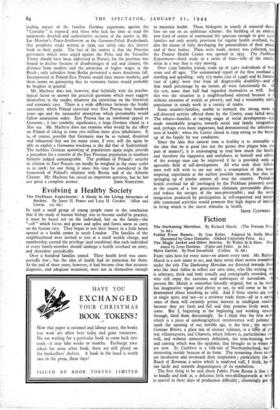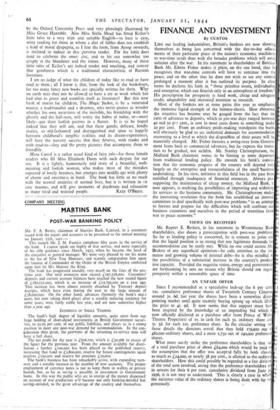Fiction
Fables From Russia. By Ivan Krilov. Adapted by Stella Me Illustrated by Grace Huxtable. (Oxford University Press. 2s.) The Magic Jacket and Other Stories. By Walter de is Mare. Ill
Crated by Irene Hawkins. (Faber and Faber. 3s. 6d.) Myra Carrol. By Noel Streatfeild. (Collins. 8s. 6d.)
FAIRY tales here for every taste—or almost every taste. Mr. Rich March is a new name to me, and these seven short stories assemb under the title The Darkening Meridian are directed towards th who like their fables to reflect our own time, who like writing t is arbitrary, thick and both visually and conceptually crowded, a who still enjoy the exercises and arabesques of surrealism. present Mr. March is somewhat forcedly original, but as he re' has imaginative vigour and plenty to say, he will come to be l determined about knocking us cold. And if these stories are r in single spies, and not—as a reviewer reads them—all in a stri some of them will certainly arouse interest in intelligent read because they are fresh and full and they promise lively work come. But I, beginning at/the beginning and working stra through, liked them decreasingly. So I think that the first sty which is a piece of autobiographical reminiscence well pointed mark the opening of our terrible age, is the best ;, the seco Gentian Bitters, a plain tale of sinister violence, is a fable of war villainousness, and Chamois, which follows it, particularises s well, and without unnecessary definition, the man-hunting in and craving which was the epidemic that brought us to where are now. St. Cuthbert is a folk-tale of Northumberland, and interesting mainly because of its form. The remaining three sto are incoherent and overreach their inspiration ; particularly On Beach of Bonanza, a satire which is rendered null, I think, by too facile and juvenile disgustingness of its symbolism.
The first thing to be said about Fables From Russia is that it
to handle and look at, a delicious little two-shillingsworth at wl to marvel in these days of production difficulty ; charmingly got
ess. ad.
and le
0 h
A ea Cr gh re ri.
by the Oxford University Press and very pleasingly illustrated by Miss Grace Huxtable. Also Miss Stella Mead has fitted Krilov's little tales to a very trim and suitable English—so here is easy, witty reading for those in whom a diet of fables does not establish a kind of moral dyspepsia, as I fear the form, from Aesop onwards, is inclined to induce in this perverse reader. Bar the fable does tend to celebrate the smart alec, and to hit out somewhat too crisply at the blunderer and the sinner. However, many of these little tales of Krilov's are indeed tender and touching, and convey that gentleness which is a traditional characteristic of Russian literature.
I am no judge of what the children of today like to read or have read to them ; all I know is that, from the look of the bookshops, far too many fancy new books are specially written for them. Why on earth may they not be allowed to have a try at work which has had time to prove and establish itself as literature? But this new book of stories for children, The Magic Jacket, is by a venerated master, a traditionalist and a dreamer, who never pauses to wonder whether his own awareness of the invisible, his friendship with the ghostly and the half-seen, will worry the babes of today, or—more likely—put their foolish parents in a fluster. It is to be hoped indeed that they will not, and that these gentle, delicate, kindly stories, so old-fashioned and distinguished and spun so happily between childhood's tangibk realities and its dream-experiences, will have the nursery success that they deserve, with reader and with read-to—they and the pretty pictures that accompany them so friendlily.
Myra Carrol is a rather usual kind of fairy jale—for those female readers who fill Miss Elizabeth Dunn with such despair for our sex. It is a lightly, humorously told story of a beautiful, well- meaning and foolish woman, who makes most of the mistakes expected of lovely heroines, but emerges into middle age with plenty of charm and sweetness in hand. The book has little or no truck with the normal anxieties of normal lives, but it is written in r.n easy manner, and will. give moments of daydream and relaxation to many tired and worried people. KATE O'BRIEN.



























 Previous page
Previous page